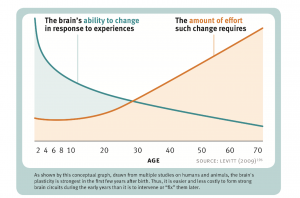Neuroplasticity: Difference between revisions
From BurnZero
No edit summary |
No edit summary |
||
| Line 1: | Line 1: | ||
[[File:Neuroplasticity.png|alt=Neuroplasticity|thumb|Neuroplasticity]] | [[File:Neuroplasticity.png|alt=Neuroplasticity|thumb|Neuroplasticity Vs Age.]] | ||
Neuroplasticity | Neuroplasticity is the ability of the brain to change its default activity in response to intrinsic or extrinsic stimuli by reorganizing its structure, functions, or connections. Humans lose their neuroplasticity as they age.<ref>'''Changes in plasticity across the lifespan''': Cause of disease and target for intervention. Accessed on 3rd March 2022, via https://www.ncbi.nlm.nih.gov/pmc/articles/PMC4392917/</ref> | ||
=== References === | === References === | ||
Revision as of 11:42, 3 March 2022
Neuroplasticity is the ability of the brain to change its default activity in response to intrinsic or extrinsic stimuli by reorganizing its structure, functions, or connections. Humans lose their neuroplasticity as they age.[1]
References
- ↑ Changes in plasticity across the lifespan: Cause of disease and target for intervention. Accessed on 3rd March 2022, via https://www.ncbi.nlm.nih.gov/pmc/articles/PMC4392917/
